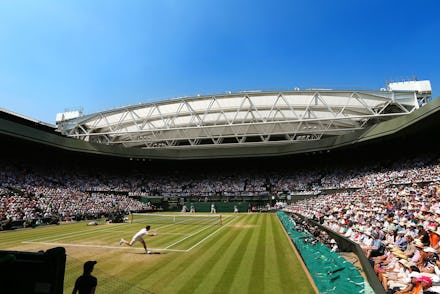Wimbledon Champions Bring Home More Than $3 Million. Here's Why They're Actually Underpaid

Prize money allocation is a hot topic on the professional tennis circuit. And all players, especially the the lower-ranked ones, argue they need to earn more to stay in the game.
And this is certainly the case at this year's Wimbeldon tournament.
This weekend at Wimbeldon, the winners of the men's and ladies' singles titles will each pocket 1.76 million British pounds (roughly $3.02 million). The players they beat will each collect 880,000 pounds as runners-up. The entire prize fund for all players — in singles, doubles, mixed, et al. — is a record 25 million pounds. Yet, the tournament could afford to pay deserving players more (perhaps twice as much) and still make a profit.
The biggest tournaments — the four Grand Slams in Australia, Paris, Wimbledon and New York — have responded with some above-inflation increases.
At Wimbledon, for example, a total prize pot of 16.06 million pounds in 2012 grew by 40% to 22.56 million pounds in 2013. That, in turn, has gone up by another 10.8% to 25 million pounds this year.
The 16.06 million pounds in 2012 was to 11.2% of tournament revenues, which totalled 143.4 million pounds. Last year's funds amounted to 15.1% of revenues of the total 149.2 million pounds. The 25 million pounds this year will be approximately 16.1% of revenues, which will likely be around 155 million pounds.
So why should the players earn more? Because in professional sports, the players are the stars. They are every bit as central to the success of the event as an A-list actor is to the success of a Hollywood blockbuster. The actors get the big bucks, and so should the players.
And they do in other sports. In English Premier League soccer, for example, the players take home something around 50% of team revenues. At other clubs, it is much higher. In NFL football, the players take 48% of the total revenue. In NBA basketball, the players take between 49% and 50%.
Even while Wimbledon has increased the amount of prize money dramatically in the past two years, the current 16% of revenue it represents in the 2014 tournament falls way below that of other sports with global profiles.
Wimbledon is a brilliant, stylishly-staged event. It is also a roaring success, financially. While not every single revenue stream and expenditure is freely available, annual accounts are published with the broader finances.
This is how much Wimbeldon is worth: Almost 150 million pounds.
Of last year's total tournament income of 149.2 million pounds, "Income from broadcasters represents more than half of the company's turnover and small number of key broadcast markets, notably the UK and the USA, provide the majority of that income."
TV income accounts for around 80 million pounds of the event's income, with around 36 million pounds last year from the BBC for live rights in the U.K., around 24 million pounds from ESPN in America for live rights in the U.S., and the balance from other nations.
The BBC has U.K. Wimbledon rights until 2017, and ESPN has U.S. rights until 2023. Income from ticket sales is around 25 million pounds per year. Roughly 500,000 people will pass through the gates to watch over 13 days of competition. From a lowly grounds pass (15 pounds to access the grounds and watch the outside courts) to hospitality seats that can cost hundreds of pounds, ticket income roughly 50 pounds per person.
Aside from broadcast and ticket revenues, the All England Club, the hosts of Wimbledon, have revenues of approximately 40 million pounds per year from a range of "official suppliers" such as Slazenger, Robinson, Rolex, IBM, Hertz, Ralph Lauren and more.
With total broadcast, ticket and commercial revenues amounting to 149.2 million pounds, and the total cost of the tournament amounting to 111.2 million pounds, the profit in 2013 was 38 million pounds. The costs include the prize fund, staff and the year-round maintenance of a world-class facility.
Where does the profit go? As part of a long-standing agreement between the All England Club and Britain's tennis federation, the Lawn Tennis Association (also known as the "tournament surplus"), each year it is given to the LTA to help develop British tennis.
But nothing dictates how large this should be. If the prize fund were doubled at a stroke to 50 million pounds, there would still be millions to spare.
That's why 1.76 million pounds for winning seven tennis matches is a poor return. Honestly!